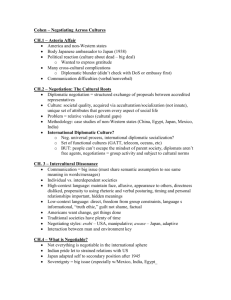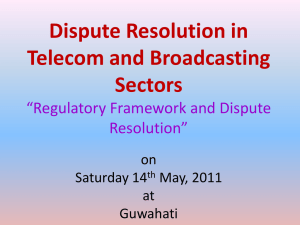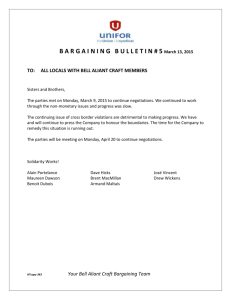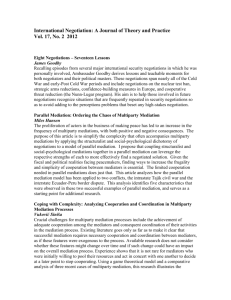International Negotiation
advertisement
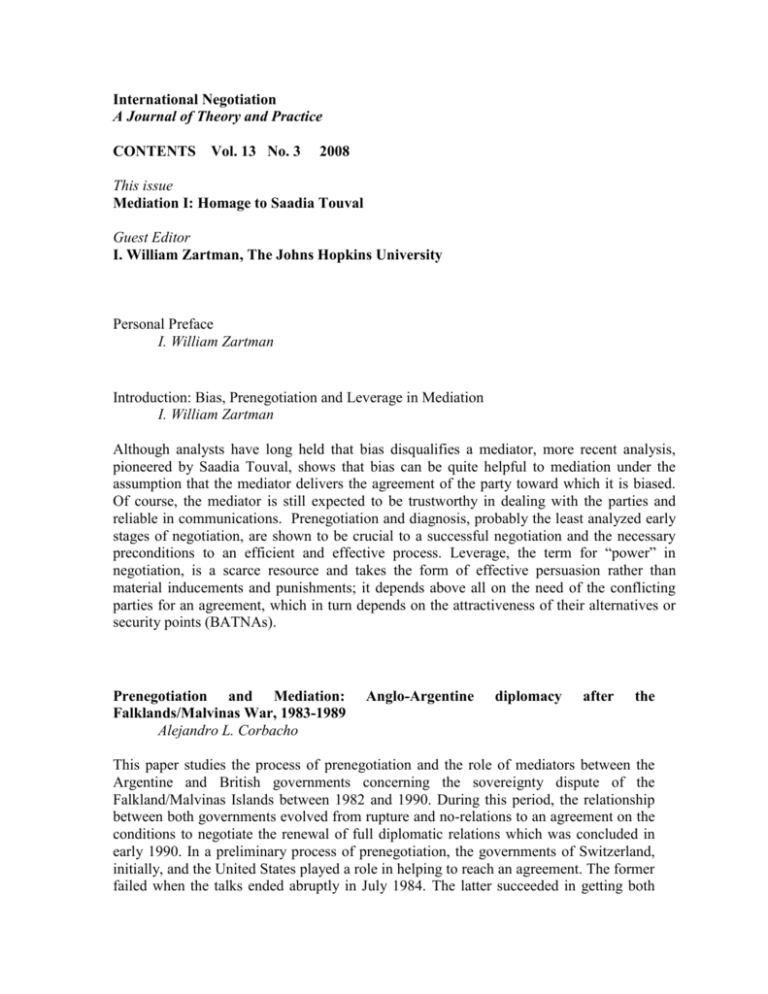
International Negotiation A Journal of Theory and Practice CONTENTS Vol. 13 No. 3 2008 This issue Mediation I: Homage to Saadia Touval Guest Editor I. William Zartman, The Johns Hopkins University Personal Preface I. William Zartman Introduction: Bias, Prenegotiation and Leverage in Mediation I. William Zartman Although analysts have long held that bias disqualifies a mediator, more recent analysis, pioneered by Saadia Touval, shows that bias can be quite helpful to mediation under the assumption that the mediator delivers the agreement of the party toward which it is biased. Of course, the mediator is still expected to be trustworthy in dealing with the parties and reliable in communications. Prenegotiation and diagnosis, probably the least analyzed early stages of negotiation, are shown to be crucial to a successful negotiation and the necessary preconditions to an efficient and effective process. Leverage, the term for “power” in negotiation, is a scarce resource and takes the form of effective persuasion rather than material inducements and punishments; it depends above all on the need of the conflicting parties for an agreement, which in turn depends on the attractiveness of their alternatives or security points (BATNAs). Prenegotiation and Mediation: Falklands/Malvinas War, 1983-1989 Alejandro L. Corbacho Anglo-Argentine diplomacy after the This paper studies the process of prenegotiation and the role of mediators between the Argentine and British governments concerning the sovereignty dispute of the Falkland/Malvinas Islands between 1982 and 1990. During this period, the relationship between both governments evolved from rupture and no-relations to an agreement on the conditions to negotiate the renewal of full diplomatic relations which was concluded in early 1990. In a preliminary process of prenegotiation, the governments of Switzerland, initially, and the United States played a role in helping to reach an agreement. The former failed when the talks ended abruptly in July 1984. The latter succeeded in getting both parties to the table and keeping them there, thus avoiding a potential rupture until the two parties reached an agreement in principle. During the prenegotiation stage, the principal parties were able to reduce the risks of escalation; they defined and narrowed the boundaries of the dispute, clearly identified the trade-offs, and structured the agenda of formal negotiations. Consequently, the likelihood of successful negotiation improves significantly when the parties reach an agreement during prenegotiation on what will be discussed later. This case also illustrate that sometimes, when negotiations reach a point of stalemate, a mediator can help to find a “zone of agreement.” When this situation occurs, the degree of involvement and the resources of the mediator are particularly important. Finally, this case confirms the assertions that effective mediation is more a matter of leverage and influence than a matter of impartiality. ‘Damned if You Do, and Damned if You Don’t’: Nordic Involvement and Images of Third-Party Neutrality in Sri Lanka Kristine Höglund and Isak Svensson Third-party actors who mediate or monitor peace often strive to uphold an image of neutrality. Yet, they commonly face accusations of partiality. The Nordic engagement in the Sri Lankan peace process is an illustration of this puzzle: despite the efforts to uphold an image of being neutral mediators and monitors, they have been seen as favoring one side or the other. This article suggests that part of the explanation for their failure to be seen as neutral lies in the fact that armed conflicts are characterized by certain asymmetries between the main antagonists – in capabilities, status and behavior. These imbalances pose particular challenges to the third party aspiring to act in a neutral manner. We suggest that third parties have two strategies available to deal with imbalances in the relationship between the contenders: 1) they can choose to disregard the asymmetrical relationship and act in an even-handed manner or 2) they can seek to counterbalance the lopsidedness. This article explores the dynamics of these strategies by analyzing the Nordic involvement in Sri Lanka’s peace process that began in 2002. Cyprus’s Accession Negotiations to the European Union: Conditional Carrots, Good Faith, and Miscalculations Saskia Ramming The European Union did not push forcefully for an intercommunal settlement that would reunite Cyprus as a prerequisite for EU accession. It gave away the carrot without tying it to a condition. Several explanations are drawn from an analysis of processual and structural factors. Prenegotiation and its Limits in Ethno-National Conflicts: A Systematic Analysis of Process and Outcomes in the Cyprus Negotiations Amira Schiff The repeated failures of negotiation in ethno-national conflicts highlight the importance of studying the relationship between the pre-negotiation process and the results of the subsequent formal negotiations. This study examines various factors that contributed to a decision by adversaries to initiate official negotiations, and how these factors affected the prospects for a negotiated agreement. Furthermore, it suggests that certain elements in the pre-negotiation process portend the nature of the changes in the parties' political positions (tactical or strategic) and the parties' readiness to reach an agreement. An exploration is presented using a case study of the negotiations over the Cyprus conflict in 2004 which resulted in the ultimate rejection by the negotiating parties of the Annan Plan in late March of 2004. We examine the connection between the prenegotiation process, from the end of 2003 until February 13, 2004, and the failure of the formal negotiations in March 2004. The analysis indicates that the deficient method and process of the pre-negotiations that took place regarding the Cyprus conflict determined the subsequent failure of the negotiations. The early detection of such factors in other negotiations over ethno-national conflicts may mitigate the causes that lead to failure, or perhaps assist in managing the process differently, so as to facilitate a more positive outcome. Enforcing a Turning Point and Imposing a Deal: An Analysis of the Darfur Abuja Negotiations of 2006 Sean P. Brooks Low expectations and international impatience forced the African Union to shift from a classical integrative approach to negotiations to “deadline diplomacy” during the final months of the Abuja talks between the Sudanese government and the Darfur rebel movements. As a result, the AU mediators – who had served as communicators and formulators – assumed the responsibility of manipulators. This transition scuttled plans for gradually arriving at the implementing details for a formula. Instead, acquiescence to power served as the chief reason for the signature of one of the movements, while the mediators showed disinterest and inflexibility in reigning in the other two movements that required a package of additional threats and inducements. Important lessons regarding the credibility of deadlines, the appropriateness of the formula, the necessity of ownership, inclusivity/exclusivity of the talks, and sufficient support for the movements in the prenegotiation and diagnosis phases can be drawn from the Abuja process.
